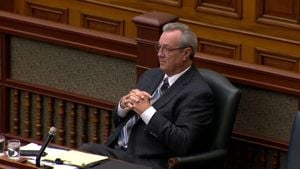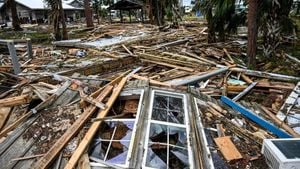The possibility of Formula 1 returning to Argentina is weaving through the fabric of the nation's sports narrative, sparking excitement among fans and officials alike. The buzz surrounding it especially amplified after the remarkable performances of young driver Franco Colapinto, whose talent on the race track is reigniting hopes for the country’s longed-for place back on the F1 calendar.
Argentina last hosted its F1 Grand Prix back in 1998. Since then, motorsport enthusiasts have yearned for the roaring engines and high-speed thrills of Formula 1 racing to return. Recent developments suggest these dreams might be stepping closer to reality. On November 16, 2024, former vice president Daniel Scioli, now serving as Argentina's tourism minister, led key discussions aimed at reviving the Grand Prix.
These talks included visiting the F1 headquarters and conversing with CEO Stefano Domenicali. According to Scioli, the meeting was cordial, reflecting the shared interests between F1 and Argentina. "Stefano knows Argentina very well," he stated, reminiscing about the 'best memories' the CEO holds of the country. This familiarity bodes well as discussions progress toward outlining what will be required for the Grand Prix's successful return.
The Argentinian Grand Prix hopes to take place at the Autodromo Oscar y Juan Galvez, Buenos Aires’ primary racetrack which was originally constructed back in the 1950s. Scioli's delegation highlighted the desire to showcase the longer loop of the course, allowing modern F1 cars to reach their top speeds rather than conforming to the previous, less popular layout used during the 1990s.
This initiative coincides neatly with the burgeoning popularity of Franco Colapinto. The young driver, only 21, has created quite the stir since making his debut with the Williams team. His performance has not only placed him under the radar of Red Bull, which is considering incorporating him as one of its main drivers, but has also driven increased attention from sponsors and fans back home.
During the recent Brazilian Grand Prix at Interlagos, thousands of Argentinians gathered to cheer for Colapinto, marking him as their new sporting hero. Scioli underscored the significance of Colapinto's impact on the national spirit: "I am very proud of what Colapinto is generating as an Argentinian," he enthused about his charisma and driving capabilities.
Yet, the road to bringing back the Grand Prix is not straightforward. The expectations of hosting such a high-profile event are hefty, especially under the current administration led by President Javier Milei, whose government is high on privatization. According to Scioli, funding for the project is expected to come solely from private sponsors, which adds economic pressure to validate the feasibility of the event.
With companies like Mercado Libre and Globant showing proactive involvement, it seems the participation of local businesses could play a pivotal role. Nevertheless, as highlighted by Scioli, the country must prove its ability to attract more corporate partnerships to shoulder the extensive renovations required to make the Buenos Aires track suitable for modern F1 standards.
Despite this enthusiasm, the challenge remains fierce. The Formula 1 calendar is competitive, consisting of only 24 slots for races annually. Argentina is up against several other nations also eager for inclusion on the itinerary. Countries like Rwanda and Thailand are current contenders, aiming for the coveted spots, presenting remarkable bids showcasing not only commercial viability but also long-term sustainability.
Scioli remains optimistic but realistic about the timeline. There has been no clear answer on how long it will take for Argentina to return to the F1 map, as each step toward meeting F1's standards requires thorough groundwork.
Taking lessons from other nations could prove beneficial. Countries like South Korea and Vietnam have made great attempts to secure F1 races but faced hurdles of organization and execution. The successful return of Argentina to the F1 circuit may depend heavily on overcoming logistical challenges and gathering unwavering support from both the government and private sectors.Strengthened by the rising popularity of Colapinto, Argentina's push for F1 is not only about racing but also about reclaiming its prestigious position on the global motorsport stage; it's about rekindling national pride and finding new sponsors willing to invest in its sports legacy.
With expectations growing and the wheels of discussion turning, Argentina prepares for what could be years of hard work to realize its dream of hosting Formula 1 once again. And whether or not Colapinto is behind the wheel representing his country when the time arrives remains to be seen, but one thing is for sure: the excitement surrounding the potential return of F1 is palpable, sparking hope and anticipation among fans and sports enthusiasts alike.



